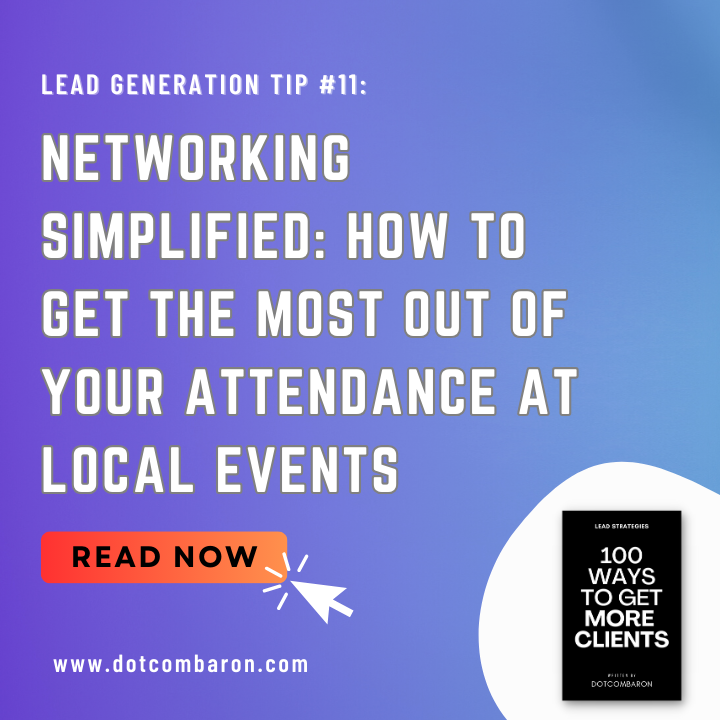Lead Generation
Networking Simplified: How to Get the Most Out of Your Attendance at Local Events | DOTCOMBARON
Navigating the maze of local events can be overwhelming. Our guide, ‘Networking Simplified: How to Get the Most Out of Your Attendance at Local Events’, strategically illuminates this path.
It equips readers with the tools to build meaningful connections, engage effectively, and leave lasting impressions.
This comprehensive guide, designed with your networking success in mind, transforms the daunting landscape into a navigable journey towards professional relationships that matter.
This Article’s Takeaways:
- Position yourself strategically and set reasonable goals for the event.
- Build relationships by treating people like friends and asking great questions.
- Make meaningful connections by drawing connections between people and offering introductions.
- Engage in conversations with genuine interest, focus on a few solid connections, and make a favorable impression in a short time.
Preparing for the Networking Event
To maximize the benefits of any networking event, effective preparation is a crucial first step. This involves finding opportunities that align with your professional aspirations, setting goals for the event, and planning how to make effective introductions.
Part of the preparation includes understanding the nature of the event, its attendees, and the organizations involved. This will not only help you in finding opportunities that are relevant to your professional interests but also equip you with the necessary knowledge to engage in meaningful conversations.
Setting goals is another essential aspect of preparation. Whether it is to meet a potential mentor, find job openings, or simply expand your professional network, having clear objectives will help you stay focused throughout the event. Furthermore, it gives you a sense of direction and purpose, enhancing the overall effectiveness of your networking efforts.
Equally important is planning how to introduce yourself effectively. The first impression can set the tone for the rest of your interaction, making it vital to create a favorable impression. A well-crafted introduction should succinctly express who you are, what you do, and what you are interested in professionally.
Ultimately, your goal should be maximizing your networking potential. This means leveraging every interaction to build meaningful connections that could provide mutual benefits in the future. It involves not just talking about yourself, but also showing genuine interest in others, asking insightful questions, and offering help when possible.
Building Relationships at the Event
Once you’ve effectively prepared for the networking event, it’s time to employ relationship-building strategies that can foster meaningful and lasting professional connections. One of the first steps toward building these relationships is to build rapport with your fellow attendees. Engage in genuine conversation, show an interest in their work and experiences, and demonstrate authenticity in all your interactions. This will establish a foundation of trust, which is essential for any professional relationship.
Introductions and guidance from the event organizer can be invaluable, granting you access to a wider network of contacts. Don’t hesitate to ask for introductions; remember, everyone is there for the same reason – to network. Sharing your contacts and resources selflessly can also help to strengthen these new relationships.
Think of networking as a puzzle of connections, with each person you meet potentially linking you to another professional or opportunity. Be receptive to these connections and, where possible, facilitate them for others. This approach not only expands your own network but also adds value to the networks of others.
Engage in meaningful dialogues rather than superficial chit-chat. Ask insightful questions, listen actively, and respond thoughtfully. Aim for conversations that delve deeper than surface-level pleasantries, as these are the interactions that are likely to lead to lasting professional relationships.
Making Meaningful Connections
Making meaningful connections at networking events requires a strategic yet sincere approach. It begins with meaningful introductions, setting the tone for a genuine and productive interaction. Introductions should be concise, clear, and reflective of who you are and what you bring to the table. This is your first opportunity to build trust, which is the cornerstone of any meaningful relationship.
Networking strategies are essential in this process, and one of the most effective strategies is to genuinely listen. By focusing on the other person’s needs and interests, you demonstrate respect and interest, which fosters trust and opens the door for deeper connection. This approach also allows you to identify opportunities where you can provide value, thereby strengthening the connection.
Effective communication is key to making these meaningful connections. It involves not just speaking clearly about your own interests and goals, but also actively listening to the other party. This two-way exchange facilitates understanding, mutual respect, and the possibility of a fruitful relationship.
Lastly, leveraging connections is an integral part of networking. This does not mean using people for your own gain. Instead, it involves identifying opportunities where you can help others by connecting them with people in your network. By doing so, you’re not only adding value to their lives but also reinforcing the strength and utility of your network.
Engaging in Conversations
While it is important to make meaningful connections at networking events, engaging effectively and authentically in conversations is equally crucial for deriving maximum benefit from these events. The process begins with active listening techniques, where you fully concentrate, understand, respond, and then remember what is being said. Active listening not only shows genuine interest, but also sets the stage for effective communication skills.
Effective communication skills involve not just speaking eloquently, but also asking thought-provoking questions, using appropriate body language, and providing thoughtful responses. These skills allow you to engage in a dynamic exchange of ideas, resulting in a richer, more engaging conversation.
Creating a positive atmosphere is another key aspect of successful conversations. This involves using humor, showing appreciation, and focusing on strengths and achievements, which can uplift the conversation and foster a sense of optimism and shared purpose.
Building trust and connection should be the ultimate goal of any conversation. Open communication, curiosity, and active listening can help uncover hidden desires and needs, fostering a sense of understanding and connection between the individuals involved. Remember, every conversation is an opportunity for personal growth and learning, where you can gain new insights, acquire new knowledge, and develop a deeper understanding of others’ perspectives.
Engaging in conversations effectively can significantly enhance your networking experience, paving the way for fruitful relationships and collaborations. As we transition into the final section, we will discuss some final tips for maximizing your networking efforts at local events.
Final Tips for Networking Events
To fully optimize your networking efforts at local events, there are a few final strategies to consider that can enhance your interactions and yield fruitful connections.
- Don’t be afraid to approach strangers and initiate conversations, as everyone is there with a similar purpose.
- Organizations like Network Under 40 offer a platform for young professionals to connect, so consider joining such groups.
Ensure to adhere to editorial standards and reprint permissions if you’re sharing content. Demonstrating active engagement and genuine interest in others can create a lasting impression, fostering stronger relationships. Avoid attempting to work the room; instead, focus on developing meaningful dialogues with a few individuals.
- Product Specs:
- Networking events
- Business cards
- Professional attire
- Pros:
- Potential to form valuable connections
- Opportunity to learn from industry experts
- Chance to promote your brand or services
- Cons:
- Can be overwhelming for introverts
- May lead to superficial connections if not approached strategically
- Requires time and effort to yield benefits.
Frequently Asked Questions:
What Should I Wear to a Networking Event to Make the Right Impression?
Understanding dress code importance is key for networking events. Opt for professional over casual attire, using color psychology to convey confidence. Accessorize appropriately, and prioritize outfit comfortability to ensure a positive impression and ease of interaction.
How Can I Overcome Anxiety or Nervousness Before Attending a Networking Event?
To overcome pre-event anxiety, consider your mindset as a muscle. Strengthen it through Confidence Building Exercises and Role Play Scenarios. Use Anxiety Reduction Techniques like Utilizing Breathing Techniques, fostering a calm, prepared demeanor for networking success.
What Strategies Can I Use to Follow-Up With Contacts After the Networking Event?
Post-networking follow-up strategies include sending personalized emails, establishing social media connections, and scheduling meetings. Strategic introductions can further strengthen relationships. Remember, effective follow-ups are key to maximizing networking event benefits.
How Can I Effectively Manage My Time at the Networking Event to Meet as Many Relevant People as Possible?
Effective time management at networking events involves strategic event preparation, setting an agenda, prioritizing contacts, engaging in speed networking, and utilizing breaks for interaction. This ensures meeting relevant individuals and maximizes networking opportunities.
Are There Any Specific Etiquette Rules to Follow at Networking Events to Ensure Positive Interactions?
At networking events, etiquette includes respectful interruptions, active listening, and non-verbal communication. Conversation starters facilitate smooth interactions while business cards exchange fosters professional connections. These practices ensure positive experiences and fruitful professional relationships.
Conclusion
In conclusion, mastering networking at local events is an attainable goal with strategic preparation and effective engagement.
Despite the common concern that networking can feel artificial, this guide underscores the importance of authenticity and genuine connection.
By adopting these strategies, individuals can not only enhance their networking skills but also transform local events into productive platforms for meaningful relationships and professional growth.






